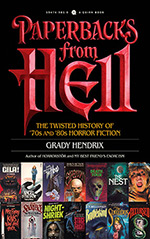
![]() charlesdee
charlesdee
1/9/2018
![]()
I had earmarked 2017 as the year for a deep dive into the novels of Clarice Lispector, Joseph Roth, and possibly Henry Green. That project never gained much traction. Then in September I ran up against Paperbacks from Hell: The Twisted History of '70's and '80's Horror Fiction by Grady Hendrix.
Hendrix brought back to life the decades I spent working in a used bookstore. His heavily illustrated volume promised an all-color walk down the memory lane that was the horror section of Half Price Books in Dallas, Texas. Flipping through Paperbacks from Hell, I recognized more authors than I did specific titles, but the look of the things, the spectacular tastelessness of the covers and the lurid horrors they promised, now cast a sickly nostalgic glow. I had read a few bestsellers at the time, and I was and remain a horror movie fan, but the books looked like junk and it never crossed my mind to read them.
The horror genre developed from the earlier craze for Gothic Romance - picture thunderstorms and a young woman fleeing a dark mansion with a single lighted window - spurred on by the success of William Peter Blatty's The Exorcist, Ira Levin's Rosemary's Baby, and Thomas Tryon'sThe Other. Few books didn't promise to be more frightening than at least one of those trendsetters. Hendrix does a solid job of sketching in this history and the publishing industry that supported it. He follows it through its profligate period and traces it's demise brought about by the overkill of splatterpunk - did anybody other than a handful of disaffected, basement-dwelling teenage boys like these books? The decision by publishers, post Silence of the Lambs, to promote serial killers over supernatural horror shifted to category to what is now termed "thrillers."
Hendrix has no illusions about the quality of most of what he writes about. What he admires is the assault on good taste and the sanctities of home, church, childhood, nature, beloved pets and favorite toys the genre offered. I think it is one of the novelized variations on The Omen film franchise that includes a woman who gives birth to the spawn of Satan through her anus and dies in the process. Hendrix adds, parenthetically, "probably from embarrassment." He is having a good time.
When Hendrix singles out an author for special attention, I realized he or she was probably worth looking into. I can now thank Hendrix for the mixed blessing of introducing me to the sexy satanic cult novels of Russ Martin; to Blackwater, the Southern Gothic epic by Michael McDowell; and, the works of Ken Greenhall. There are others on my list, and their books are not easy to track down. Lispector, Roth, and Green will have to wait while I scour used bookstores, interlibrary loan, and the internet (where these books command outrageously high prices).
Damn you, Grady Hendrix. I remain under the baneful influence of your evil book.